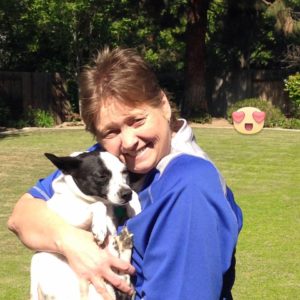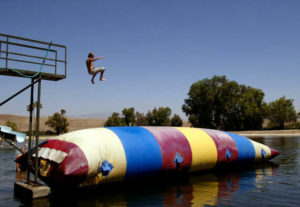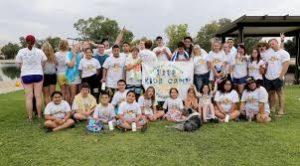Today SevenPonds talks to Cherie Shoemake about Kids Camp, a summer camp for grieving children ages 8 to 16 who have recently experienced the loss of someone close to them. Cherie is the director of Optimal Hospice Foundation, the organization that runs Kids Camp. Cherie tells SevenPonds about the powerful impact camp has on campers’ grief journeys.

Cherie Shoemake
Ellary Allis: Who are the counselors at camp and what kind of training do they go through?
Cherie Shoemake: Optimal Hospice Foundation provides each camp a camp nurse who is either an RN or an LVN who works for Optimal. And then they provide us a trained bereavement counselor who works in the community around where the camp is located. As far as the rest of the counselors, it varies a little from camp to camp. At our camp in Northern California, the counselors are either Optimal employees or volunteers, so they all work in the realm of hospice. At the Bakersfield camp, it’s a little bit different. People have been working at the camp for years and years, and it’s a mix. We’ve got people in law enforcement who are counselors, people who are teachers, people who work in health care.
Ellary Allis: Have all of those counselors personally experienced a loss of someone close to them?
Cherie Shoemake: I’d say 95 to 98 percent of the counselors are people who have experienced that kind of loss. That’s helpful, because it gives them that intimate knowledge on what grieving children are dealing with.
Ellary Allis: Is there any follow up care for the kids after they leave camp?
Cherie Shoemake: Yes, each family leaves camp with a packet that includes a full list of affirmations we use at camp, with some suggestions of how to use those at home. That’s important because that’s something the even the camper’s parents or grandparents can use as well. They go home with lists of various available resources that they can utilize, including a list of grief support groups that Optimal provides in the various communities we work in. All grief support from Optimal is free of charge. Even if you don’t have a loved one on service with us, you can still utilize our services free of charge. That can include groups and also one-on-one counseling. We provide counseling for families or just the grieving children — whatever the needs of that particular family are. So they all go home with that information. It’s a great help to a lot of those families, many of them don’t know they have access to those resources.

Credit; bakersfield.com
Then, three months after camp ends, each child receives another packet in the mail, again with additional follow up resources. They also get a reminder about the availability of the grief support groups and a reminder about what number to call if anyone in the family is needing any assistance. The kids also get access to all of the pictures that we take at camp. (We take about 300 pictures every session). We try to make sure all of the kids are included in those photos, and then they all get a group photo at the end. We just try to make sure they know we’re there for them after camp ends.
Ellary Allis: How has being involved with kids camp affected you personally?
Cherie Shoemake: I’ve been so lucky to benefit from the knowledge of the people I work with: Scott Haner, our camp director, who is really wonderful; Dave in our Northern California office; and James in Fresno. Cindy Stone, who was the bereavement counselor at the camp in Bakersfield when I first started, was also a great mentor to me. She specializes in children’s bereavement, and her experience and input really helped shape the direction of the camp over the last five years.
I feel like I’ve experienced a lot of growth between my first year of running camp until now. Before my first camp, I was skeptical about what could really be accomplished for grieving children in two days — our camp is only two days long, mind you. But I’ve gone through 17 sessions of camp now, and I’m blown away every single time. The transformation that happens in two days is remarkable. To see a kid show up and just be so angry, angry, angry, and then leave so open and engaged, thanking us, running back to say, “I can’t leave without giving you a hug,” and asking if they can be junior counselors the following year, it’s so powerful.
I think a lot of that change has to do with the fact that we give them power. We don’t tell them how they should feel or how they should deal with their grief. We just say, “Hey, here are some tools. Some of them are going to work for you, some aren’t.” It’s powerful for them to be treated with that level of respect. Sometimes we don’t even know where to start with our own grief. Sometimes we don’t even know that we’re grieving. Sometimes kids whose parents are trying to figure out their grief perhaps don’t get the kind of attention they need. To give them that attention is also very powerful.
One thing I see sometimes on the referral form and in the registration packet is a parent writing, “You know I don’t think my kid is really having a hard time. I don’t see them crying, and I think they’re probably doing OK.” But that is so often far from the truth. The parents don’t recognize that because the child is dealing with their grief differently, it doesn’t mean they’re not grieving.

Credit: Bakersfield.com
Ellary Allis: It sounds like you really do provide such important support in that gap where kids fall sometimes, as their guardians or parents are dealing with both their own chaotic emotions in the wake of a death, and also potentially trying to figure out important practical issues like, “How do I keep a roof over our head with my spouse gone?”
Cherie: Yes. Camp can also provide a reprieve for parents who are overwhelmed. This past year there was a gentleman who had five kids and had lost his wife. Since she had died, he’d not done anything for himself. He had not been away with friends, or done anything without the kids. Our bereavement counselor was doing support with this particular family and he told the dad, “Your kids are gonna go to camp and you are going to call up some of your friends and take a weekend for yourself.” I hadn’t even thought about what camp can potentially provide for a parent in that way — a little bit of respite for the parent for a couple of days.
Ellary Allis: Thank you so much for taking the time to speak with me, Cherie. I’m so impressed with the work that you all at Kids Camp are doing.
Cherie Shoemaker: You’re very welcome! Thanks for taking an interest in what we do and reaching out!
Did you miss part one of our interview with Cherie? If so, please catch up here.

 What Is It Like To Run A Camp for Grieving Children?
What Is It Like To Run A Camp for Grieving Children?


 Final Messages of the Dying
Final Messages of the Dying
 Will I Die in Pain?
Will I Die in Pain?















